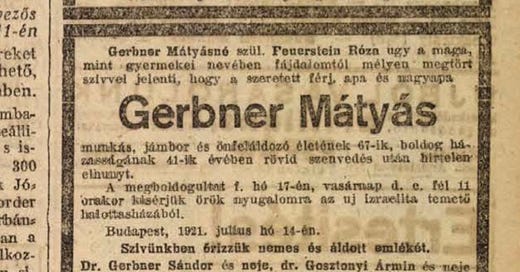Ever since discovering Opapa’s Jewish roots, I’ve wondered whether he grew up identifying as “Jewish,” whether he went to synagogue, and whether his family was observant of Jewish holidays and traditions.
A few weeks ago, I found out that Opapa was required to take “Religion” classes at his high school, and since he was Jewish, he took courses about Judaism. That was fascinating, but it still didn’t answer my question about what Opapa learned at home, with his family.
As I read more of Opapa’s letters, however, the answers are slowly starting to reveal themselves. In Árpád’s letter to Opapa from April 12, 1939, for example, he writes the following:
Nothing else significant happens here. Aunt Józsa was moved when she remembered the performance you gave on Seder Evening. On Easter Monday Ilonka and her family, and Pogány visited us. We did not go anywhere.
Here, Árpád mentions two holidays: he refers to (Passover) Seder, and also to Easter Monday. So, a Christian holiday and a Jewish holiday. It doesn’t seem like the Gerbners celebrated Easter — more likely, “Ilonka and her family” just came to visit — but it is clear that Opapa gave a “performance…on Seder Evening.”
That’s a pretty interesting tidbit. It means that the family did gather for Passover seder, and Opapa gave a performance. What could the performance have been, I wonder? Why had it “moved” Aunt Józsa?
Also, who is Aunt Józsa?
After a little digging, I figured out that “Aunt Józsa” is Jósza Gerbner, one of Árpád’s many siblings. In Opapa’s autobiography draft, he wrote that Árpád was “the youngest of 12 children in a family that demonstrated its patriotism by naming him for the infamous, but in Hungary much admired, Arpad.”
I haven’t been able to find records for all twelve children, but at least nine of them were listed in the announcement of the Mátyas Gerbner’s death in 1921. Mátyas was Opapa’s grandfather, and Árpad’s father.
“Gerbner Józsa” is listed as the wife of Bloch Sándor, and is one of several siblings who attended Mátyás’s funeral at the “New Israelite Cemetery” in 1921. Other “Gerbners” present were Sándor, Margit, Hedvig, Erzsébet, József, Irma, Péter, and György.
Seeing the names of all of Árpád’s relatives, it becomes clear that Opapa grew up with a large, extended Jewish family. Together, the Gerbner family celebrated at least some Jewish holidays.
The Gerbners were also connected with a broader global Jewish network. When Opapa was fleeing Hungary in 1939, Árpád wrote — in the same letter from April 1939 — that he should connect with a Jewish organization called “Joint,” which is now known as JDC. It’s a Jewish Humanitarian organization, founded in 1914.
…A great help might be for you the address that Aunt Józsa gave you to the wife of the chairman of Joint – a Hungarian woman. I have talked about this with Aunt Józsa over the phone – she called me when your postcard arrived – and she said that you can count on this lady one hundred percent, as they have a very pleasant friendship. The Joint is some kind of Jewish world organization. Even if it does not have a great influence, I am sure that they will be able to arrange – such things can be arranged for immigrants even here – that your residence permit will be extended by two weeks, and you will not be thrown out of France.
Again, it is Aunt Józsa who appears to have the most extensive Jewish network: she knows the “wife of the chairman of Joint” who is “a Hungarian woman.” I can imagine her talking to Árpád “over the phone,” trying to help arrange Opapa’s safe passage out of Europe. She assures her brother Árpád that his son could “count on this lady one hundred percent.”
Árpád seems to know less about this organization than his sister. He explains to Opapa that it is “some kind of Jewish world organization,” but it is Aunt Józsa who has both the knowledge and the connections.
Aunt Józsa was also the one who was most “moved” by Opapa’s performace at the Passover seder. I never heard Opapa talk about Aunt Józsa, but from these letters, it seems like she was a strong, supportive, and well-connected aunt who cared about Opapa’s Jewish education and was well-connected in the Jewish world. She may also have provided the key connection for him to escape Europe. Either way, I’m grateful to her.
***
Nuts to crack:
What could Opapa’s “performance” on “Seder evening” have been? Would this likely have been a religious performance, or could it have been anything?
It seems like Aunt Józsa is listed as “Josefa Gerbner” in some sources (birth record on Jewish Gen), and “Sandorne Bloch” in others. I found her listed as a survivor of in the US Holocaust Museum database. I haven’t found her death record yet. Any leads or more info about her?
Opapa wrote that Árpád was the “youngest of 12” but based on the records on JewishGen, it doesn’t seem like he was the youngest. Was Opapa wrong? And did Mátyás Gerbner and Roza Feuerstein really have twelve children? It seems like some may have died in infancy.





Wow! Amazing findings. Just imagine how many relatives we must have who we don't know about! (Descendants of the ones who survived 1939 - 1945)